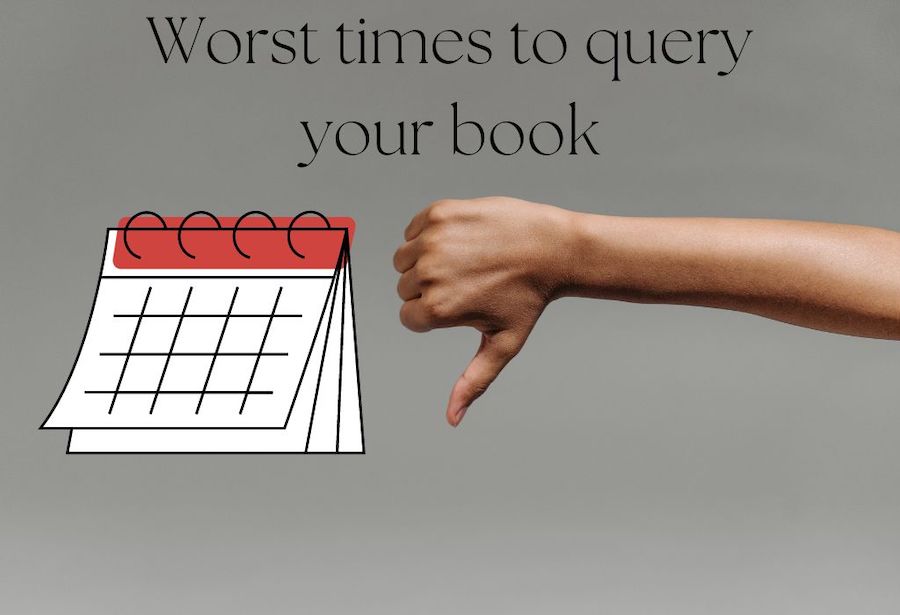If you’re a hopeful writer who’s looking to get your manuscript out into the world, you undoubtedly want to time when you contact agents and publishers so that you give your book the best chance to be noticed. Submit your book too early and there’s a chance it will get buried under a pile of other submissions. Too late, and there might be a longer-than-usual delay because agents and editors are on vacation. Likewise, self-publish your book at the best time of year and maximize your profits. Do it at the wrong time and risk struggling to get readers to find it.
Is there a ‘right’ time to contact literary agents and publishers, or to publish your book? Below, we break down which times of the year are ‘best’ for querying, pitching, and self-publishing.
Note: This article has been updated as of 20/11/23

What are the worst months to query your book?
- Winter holiday season (November and December) — This is generally not a good time to contact agents and publishers. Many literary agencies will often stop accepting queries at the end of November. This is when they start to wind down for the holiday period. Literary agents and publishing house editors tend to use this time to focus on finishing any outstanding work or their existing clients as they get ready for the new year. Thus, they’re not looking to take on anything new.
- Another reason not to contact literary agents and publishers in December is that there tends to be an uptick in query submissions early in the month. This is because NaNoWriMo ends on November 30th and some authors jump straight into querying their NaNo manuscripts. Remember though, finishing a novel does not mean it’s necessarily ready for submission. It’s understandable to be excited. However, it usually takes six months to a year (minimum) to edit your book, have a professional book editor look at it, and prepare to query literary agents and publishers.
- Early in the new year (January) — While you’re at it, scratch the first few weeks of January off your list, too. Most literary agents and editors are just getting back into the swing of things. They’re also dealing with a backlog of query letters from the previous year. Querying first thing in the new year might mean your pitch gets lost in the slush pile.
- Summer (July, August) — These are slower months in publishing and usually not a good time to contact literary agents and publishers. Many industry professionals take their holidays during these months or are working at a lower capacity. August can be a tricky month for literary agents and publishers, too. Many must then deal with the backlog of queries and manuscripts that built up whilst they were away.

When are the best months to query your book?
- Early in the year (February, March, April) — Once you’ve given literary agents and publishing professionals a few weeks to get back into the swing of things and tackle that slush pile, you can start querying! During these months, literary agents are out of vacation mode, energized from their time away, and back at full-working capacity. Publishers, also, tend to budget for new or debut projects in the spring and fall.
- Another reason to query or contact literary agents and publishers in the early months of the year is that, according to the data, there is an uptick in publishing deals in March.
- Early summer (June) — This is another time of the year where there tends to be an uptick in publishing deals. In anticipation of the upcoming summer holidays, literary agents usually begin holding off on accepting new query submissions. This frees up some space for publishing houses to accept direct submissions. However, keep in mind that not all publishing houses accept submission directly from authors. Always research any literary agency or publishing house thoroughly before you submit.

When is the best time to self-publish my book?
- January: Everyone is setting New Year’s resolutions in January, which is why books in the genres of self-help, how-to, travel planning, and diet or exercise generally do well.
Think: You Have Everything You Need to Get What You Want by Zach Touchon
- February: People are thinking about love in February! This makes it a great time to publish romance and poetry. If your book genre doesn’t fall under either of these categories, don’t worry. It turns out that February is a great time, in general, for self-publishing, as well. The weather is still cold and dreary. This means many people are stuck at home and browsing the internet for interesting books to distract them.
E.g.: A Year: And Other Poems by Jos Charles
- March: Mother’s Day falls in this month, so light-hearted fiction and female-centric thrillers are big at this time of year.
Example: The Reunion by Kayla Olson
- April–May: This is a lull period. No specific genre is particularly popular.
- June–August: Summer is in full swing and fiction beach reads are all the rage! Genre doesn’t matter here; ease of reading does. If you’ve got a book that can be read in one or two sittings, whether it be thriller, romance, science-fiction, or something else, it will probably do well in the summer months, when people are looking for relaxing, easy reading.
Example: Book Lovers by Emily Henry
- September: Kids and college students are off to school, and self-help experiences another popularity boost. Empty-nesters, in particular, are looking for hobby books, how-to, and self-help.
Think: That Sounds Fun by Annie F. Downs
- October: With Halloween at the end of the month, horror is on everyone’s mind! Not only are people devouring horror films, but they love finding great horror novels to read, too.
Example: Too Near the Dead by Helen Grant
- November–December: This is another lull where there isn’t any particular genre that’s popular. Most people are looking for bookish gifts ahead of the holiday season, so, regardless of your genre, you should consider doing some extra advertising in these months so your book gets a good bump in sales.

What if I queried or self-published at the ‘wrong’ time of year?
At the end of the day, there’s not really any right or wrong time. Yes, you may stand a better chance by querying or self-publishing during certain months, or it might make no difference at all. Regardless of which publishing option you choose, some things just come down to pure luck, and your own prep will count for more than the time of year. So, if you’ve queried or self-published at the ‘wrong’ time of the year, don’t despair. Even during the supposed worst months, there are still numerous publishing deals being made. And in self-publishing, getting eyes on your books mostly comes down to good, consistent marketing.
You can’t control what happens to your query or manuscript once they’re out of your hands. Even if you self-publish, you ultimately can’t control whether or not people will buy, read, and review your book. So, focus on what you can control before sending it out. Write a great query letter and synopsis for your book. Brainstorm an eye-catching title and exciting blurb. Above all, don’t rush the editing process and hire a good professional editor to give your book that extra shine (especially if you plan to self-publish). And, once your book is out there, move on to the next project! It may seem impossible to not think about your submission or self-published book, but all you can really do now is write another great story.


